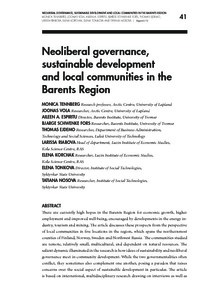Neoliberal governance, sustainable development and local communities in the Barents Region
Tennberg, Monica; Vola, Joonas; Espiritu, Aileen A.; Fors, Bjarge Schwenke; Ejdemo, Thomas; Riabova, Larissa; Korchak, Elena; Tonkova, Elena; Nosova, Tatiana (2014)
Tennberg, Monica
Vola, Joonas
Espiritu, Aileen A.
Fors, Bjarge Schwenke
Ejdemo, Thomas
Riabova, Larissa
Korchak, Elena
Tonkova, Elena
Nosova, Tatiana
Lapin yliopisto, Arktinen keskus
2014
Barents Studies 1 (1)
openAccess
Julkaisun pysyvä osoite on
https://urn.fi/URN:NBN:fi:ula-201404031060
https://urn.fi/URN:NBN:fi:ula-201404031060
Tiivistelmä
There are currently high hopes in the Barents Region for economic growth, higher
employment and improved well-being, encouraged by developments in the energy industry,
tourism and mining. The article discusses these prospects from the perspective
of local communities in five locations in the region, which spans the northernmost
counties of Finland, Norway, Sweden and Northwest Russia. The communities studied
are remote, relatively small, multicultural, and dependent on natural resources. The
salient dynamic illuminated in the research is how ideas of sustainability and neoliberal
governance meet in community development. While the two governmentalities often
conflict, they sometimes also complement one another, posing a paradox that raises
concerns over the social aspect of sustainable development in particular. The article
is based on international, multidisciplinary research drawing on interviews as well as statistical and documentary analysis.
employment and improved well-being, encouraged by developments in the energy industry,
tourism and mining. The article discusses these prospects from the perspective
of local communities in five locations in the region, which spans the northernmost
counties of Finland, Norway, Sweden and Northwest Russia. The communities studied
are remote, relatively small, multicultural, and dependent on natural resources. The
salient dynamic illuminated in the research is how ideas of sustainability and neoliberal
governance meet in community development. While the two governmentalities often
conflict, they sometimes also complement one another, posing a paradox that raises
concerns over the social aspect of sustainable development in particular. The article
is based on international, multidisciplinary research drawing on interviews as well as statistical and documentary analysis.
Kokoelmat
- Barents Studies [120]
